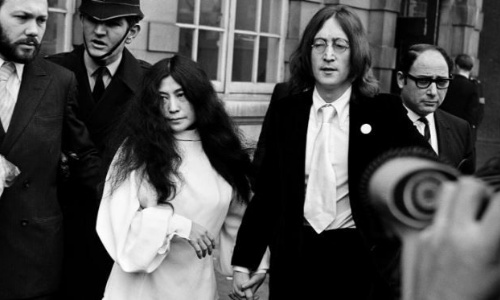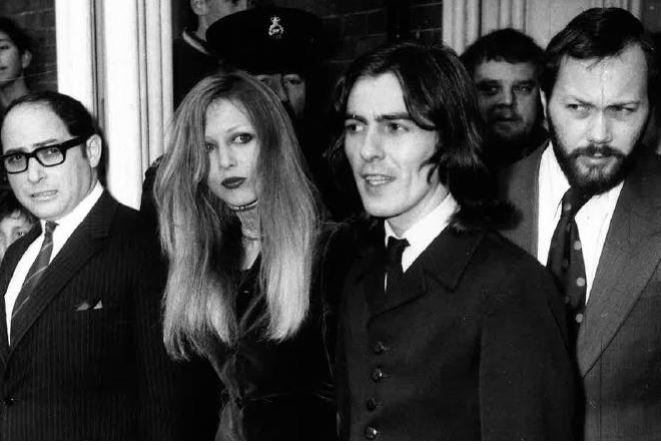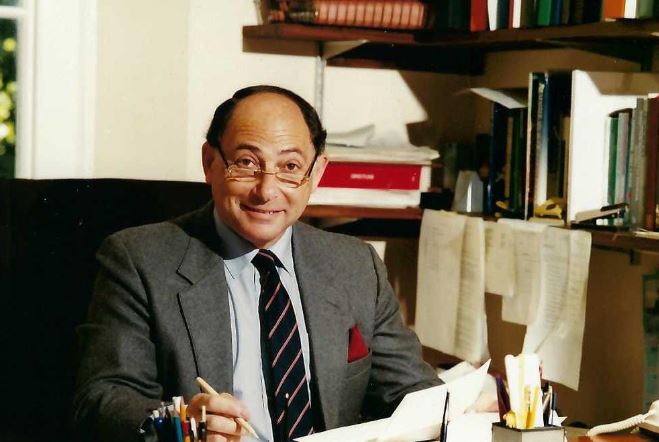Martin Polden OBE (1942-1947)

Polden pictured with John Lennon and Yoko Ono after he had admitted cannabis possession in court in 1968.
In a chambers at Inner Temple, Martin Polden sat opposite John Mortimer QC, who was surveying an upside-down photograph with bewilderment. “I suppose it’s a question of how you look at it,” said Mortimer, his head tilted to one side.
It was November 1968 and the black-and-white photo depicted John Lennon and Yoko Ono standing with their arms wrapped around each other, naked. They wanted to use it for the cover of their new album Two Virgins but were unsure whether they would be in breach of the laws of decency, so they approached Polden, a renowned civil liberties solicitor who had defended them before. Polden in turn sought the advice of Mortimer, who was well-versed in matters of public morality and would go on to defend Oz magazine and the Sex Pistols in high-profile obscenity trials. In the end it was decided that the album sleeve could be sold over the counter in a brown paper bag “to veil their nether regions”.
A month before, Polden had received a curious phone call: “Could I speak to Martin Polden?” said the soft Liverpudlian voice on the line. “This is George Harrison of the famous Beatles.” Thinking it was a hoax, Polden put the phone down, but when Harrison called back he asked if Polden could come to their Abbey Road studios, because “you, Martin, are the tops for this”.
That day Detective Sergeant Norman “Nobby” Pilcher, the zealous head of the Drugs Squad, had muscled his way into Ono and Lennon’s home in Marylebone by posing as a postman and found cannabis resin. Polden worked for Release, a legal advice agency set up by Caroline Coon and Rufus Harris after Mick Jagger and Keith Richards’ Redlands drugs bust in 1967, and had built a reputation for being the “go-to” drugs lawyer for the rockocracy.
Pilcher tried to strike a deal with Polden. It was declined. At the crowd-choked Marylebone court the next day - “my clients seemed better equipped for this adulation”, he recalled - Polden argued that it was a “highly emotional situation” because they had recently suffered a miscarriage and Lennon had claimed the year before to have renounced drugs after becoming a disciple of Maharishi Mahesh Yogi.
“He is an artist of note and integrity,” Polden declared. “He has brought pleasure to millions. He has stood by his views. He is entitled to some compassion of the court.” Lennon pleaded guilty and got off with a £150 fine and a warning that another offence would result in jail time.
Polden, meanwhile, had become close to Lennon - and his wife, Margie, an obstetric physiotherapist, treated Ono after her miscarriage.

He would also represent Harrison and Pattie Boyd when they were charged with possessing 570g of cannabis in 1969 and again in 1971 when Harrison was charged with driving into a policeman. “Because of some loop of destiny, he now found himself the most prized pot lawyer east of Manhattan,” wrote Derek Taylor in his 1973 autobiography As Time Goes By, “and amazed to be that way and probably, though he never showed it, sometimes a little nervous. Civil liberties lawyers are not liked by the establishment.”
Though his hair was neatly trimmed and his suits well tailored, Polden indeed preferred the company of his anti-establishment friends. He had tea with Harrison and Boyd at Kinfauns, their house in Surrey, where Harrison played an unreleased My Sweet Lord in his kitchen, and the visit was reciprocated in their Willesden home.
Polden recalled one particularly “crazy” card game of Happy Families with Boyd, Phil Spector, and the future Beatles manager Allen Klein; Lionel Bart (another of Pilcher’s victims) eating his wife’s chicken soup, and the air being filled with Hare Krishna chants from Harrison’s entourage.

He was born Martin Alan Podeshva in 1928 in Clapton, Hackney, the only child of Ralph, a skilled tailor who changed the family name to Polden when Martin, who was Jewish, was young and Debbie (née Tree), a typist and legal secretary who had left school at 14.
During the Second World War the family were evacuated to High Wycombe, which offered Martin more opportunity than his life back in the East End. Here at the RGS he recalled pushing his way through crowds to hear Sir Winston Churchill speak during his 1945 election campaign, though Polden decided to campaign for the Labour Party and in 1947 he wrote a letter to his local MP about “the growing menace of fascism”, receiving a personal reply from the Home Secretary. He also wrote poems, theatre reviews and articles for his school magazine, including one titled The Voice of Democracy: A Defence of the ‘Hyde Park Orators’.
Motivated to help his parents financially, after a law degree at LSE he trained at a small, Dickensian firm in Shepherd’s Bush called WP Davies & Son, populated by lawyers who enjoyed long liquid lunches and snuff for dessert. The firm had advised George Joseph Smith on the insurance on one of his doomed wives during the infamous “brides in the bath” case.
In 1958 he set up his own firm, Polden & Co, which morphed into Polden Bishop & Gale, then Rubinstein Callingham Polden & Gale. The firm’s main offices were in the West End, though Polden’s widowed mother worked in their Willesden office under the office nickname “Mrs Nedlop” (an anadrome of Polden).
With his square glasses and pinstripe suit, Polden cut a conservative figure beside the lank-haired hippies who wafted into his office but he was just as open-minded and liberal. He was interested in the human rights issues that trailed the cultural rebellions of the Sixties, particularly in the wake of William Rees-Mogg’s “Who Breaks a Butterfly on a Wheel?” leading article for The Times in 1967, in which he argued against the conviction of Mick Jagger on trumped-up drugs charges.
Polden, who considered himself “a respectable professional man”, began to represent those prosecuted during the 1968 protests, such as the students who staged a sit-in at the Hornsey College of Art, and youths who were starting their careers with criminal records from minor drugs charges. He learnt on the job. When one client called and said that police had arrived about his “grass”, Polden wondered aloud why the front lawn of a man who lived in a flat might be a prosecutable offence. “There began my unintended enmeshment into the drug world,” he said.
There were also some close shaves. In the 1970s Polden unwittingly found himself at the back of a pub being asked for legal assistance by a member of the IRA, and he once discovered a revolver in the drawer of a client’s hotel room.
Establishing himself as a “generalist” lawyer meant that Polden’s clients were drawn from different walks of life. They included the actor Ron Moody, the fashion designer Ossie Clark, the parapsychologist and cannabis rights activist Stephen Abrams and Chris Jagger’s girlfriend Suzy Creamcheese (real name, Susan Zeiger), who was arrested during the “free Brian Jones” protest.
In the 1970s he veered into corporate then property development law but in the early 1980s underwent something of a legal volte face — what he called his “conversion on the road to Swindon”. He had been approached by clients who wanted to build on an area off the M4, and, after planning permission was granted, the environmentalist Diana Schumacher highlighted to Polden the vast discrepancies between the legal resources available to developers and the local authorities who opposed the decision.
With David Hall, a biology professor at King’s College London, Schumacher and Polden founded the Environmental Law Foundation (ELF) in 1992, with Polden as chairman. The ELF was the first to establish a network of pro-bono lawyers and environmental experts willing to help communities confronted with planning and environmental issues. In 2011 the King, then the Prince of Wales, became the charity’s president.
In 1994 Polden co-wrote with Simon Jackson The Environment and the Law: A Practical Guide and he was an active member of the Parliamentary Environment Group and UKELA (United Kingdom Environmental Law Association). In 2006 he was appointed OBE for services to environmental law.
In 1956 he married Margaret (Margie) Fry, who he met as an amateur actor at the Ben Uri drama group, where they performed musicals in garish make-up - though, unlike Margie, Polden’s best review was for playing the ghost of Banquo in a school production of Macbeth. After she died unexpectedly in 1998, at the age of 67, Polden spent more time at their holiday home in Mudeford, Dorset, where he had developed a love of sailing and a reputation for being rather bad at it. Still, he enjoyed sleeping out on deck with his dog Simba and his children asleep in the cabin. They survive him: Daniel is a solicitor, Ruth is a somatic movement therapist, Esther, a counsellor and Sarah is a book editor.
Polden was a gifted storyteller and in his rich baritone voice would, in later years, enjoy regaling tales of his days defending the law-skirting beatniks of the Sixties - though some, he recalled, did not always heed his advice. He recalled one of his favourite clients declaring: “I hear what you are saying, Martin, but remember; you are sitting in my Rolls-Royce.”
Martin Polden OBE, lawyer, was born on 23 June 1928. He died on 5 April 2023, aged 94.